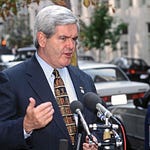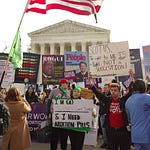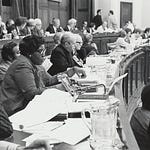
In the introduction to this episode, we begin with some false and partially false claims. Listeners should know that aborting a viable, healthy fetus in the third trimester is a vanishingly rare event, and that this has never been either best medical practice, nor has abortion been guaranteed under federal law in the United States after 24 weeks. And despite a talking point that has been repeated across GOP campaigns, no child is aborted “after birth”—that would be a murder. We can also dismiss the idea that the only two Republican presidential candidates still standing just want us all agree on an arbitrary number of weeks, after which the details of maternal and fetal health will no longer matter.
The ideas that have succeeded in reversing the right to abortion have nothing to do with the procedure as those who are pregnant experience it. What you will hear in the incoherent statements made at the beginning of the episode is not policy, but fear and uncertainty. Former President Donald J. Trump and former South Carolina Governor and United Nations Ambassador Nikki Haley know that their own party’s abortion policies have become electoral Kryptonite.
Let’s recap how abortion, after almost 50 years, once again became a matter of state law. On June 24, 2022, the Supreme Court of the United States delivered its split opinion in Dobbs v. Jackson Women’s Health Organization, overturning Roe v. Wade, a 1973 decision that created a federal right to abortion at 24 weeks. A judicial decision that pro-life activists had mourned with a demonstration in Washington every January 22 was eviscerated. Trigger laws, and pre-Roe zombie laws, stripped women of their right to an abortion, and created harsh new penalties for anyone involved in the procedure.
When clinics closed, both economically marginal women and men lost access to a range of reproductive services. Although the cost of raising an additional child is one reason why people choose abortion, no state banning abortion has come up with a plan to support larger families throughout the life of a child.
Furthermore, many physicians are afraid to perform life-saving operations that imperil a pregnancy, out of concern they will be subject to felony charges and fines. As a result, in some states, women have been forced to carry unviable or dead fetuses to term because medical facilities are unwilling to test the law.
Conservative politicians have claimed that things are now as they should be, since Roe foreclosed states making their own decisions about whether to reform or eliminate their abortion laws. And then, a funny thing happened on the way to the 2024 election: as it turns out, Americans of all political persuasions want to make their own decision about whether to have children.
A year after Dobbs, 34% of Americans wanted abortion to be legal in all circumstances, and 51% wanted it to be legal, with some restrictions. And a great many people in that 85% are the Republican and independent voters that any GOP candidate will need to beat Joe Biden in November 2024. They are the voters that the GOP is losing in key elections and referenda, even in red states.
But the idea that restoring Roe would also restore reproductive justice relies on bad history: the two were never the same, and the right to abortion is just one piece of the puzzle we call reproductive rights. To understand that is to understand a bigger failure in 20th century feminism: that mostly white and middle-class pro-choice activists failed to connect with the needs of American women, largely poor and of color, who had been involuntarily robbed of their fertility be deceit and by design.
That story takes us back to the states, specifically to New York, where abortion was decriminalized in 1970—and a state where thousands of women of color, in custodial situations, on reservations, disabled, and on welfare--were also sterilized. It was a state where women mobilized powerfully for the right to abortion, and one where a larger, more diverse movement extended the struggle beyond Roe to fight for the right to have babies.
“It was only after I lost her that I realized how much I had failed to learn from my mother,” historian Felicia Kornbluh writes in A Woman’s Life Is a Human Life: My Mother, Our Neighbor, and the Journey from Reproductive Rights to Reproductive Justice (2023), just now out in paper from Grove Atlantic. “Why was she so passionate about reproductive rights?”
As it turned out, Kornbluh’s mother, Beatrice Kornbluh Braun, a lawyer, had not only been part of the long struggle to decriminalize abortion in New York State, she had drafted repeal legislation on which the 1970 bill was based and persuaded a lawmaker to promote it. That state-by-state campaign long preceded—and was prematurely cut off—by the decision in Roe v. Wade.
When Kornbluh dug into parallel political activism to end sterilization abuse and transform a medical system that hurt women, she discovered something else. Helen Rodríguez-Triás, the physician who had spearheaded those reforms and founded the Committee to End Sterilization Abuse, or CESA, had lived across the hall in their New York apartment building. A Woman’s Life Is A Human Life tells both these stories in a post-Dobbs world where we are fighting for reproductive justice once again.
Show notes:
Felicia and Claire discuss the history of criminalizing abortion, and explains that the procedure became illegal only in the 19th century. You can read this story in Marvin Olasky and Leah Savas, The Story of Abortion in America: A Street-Level History, 1652–2022 (Crossway, 2013).
Claire mentions her research in feminist Susan Brownmiller’s archives: they can be found at the Schlesinger Library, Harvard University
Felicia mentions conservatives and liberals who support abortion as a form of birth control. You can learn more about this in Donald R. Critchlow, Intended Consequences: Birth Control, Abortion, and the Federal Government in Modern America (Oxford University Press, 1999).
The clip of George Michaels casting his deciding vote for abortion rights in New York State was broadcast on the ABC Evening News. You can read more about Michaels here.
To listen to Claire’s conversation with historian Annelise Orleck, where they discuss Black women in on Medicaid not having access to birth control, go here.
Felicia points to civil rights activist Fannie Lou Hamer’s “Mississippi appendectomy,” and her heartbreak at being unable to conceive a child. You can read about that, and more about Hamer, in Blaine’s Until I Am Free: Fannie Lou Hamer's Enduring Message to America (Beacon Press, 2021). You can also read more about coercive and custodial sterilization in Molly Ladd-Taylor, Fixing the Poor: Eugenic Sterilization and Child Welfare in the Twentieth Century (Johns Hopkins University Press, 2020); and about the larger context for violating Puerto Rican women’s rights in Laura Briggs, Reproducing Empire: Race, Sex, Science, and U.S. Imperialism in Puerto Rico (University of California Press, 2002).
You can download this podcast here or subscribe for free on Apple iTunes, Spotify, Google Podcasts, or Soundcloud. And if you liked this episode, please join us at Political Junkie!
If you enjoyed this episode, why not try:
Episode 39, Old Enough To Fight, Old Enough To Vote:
A conversation with historian Jennifer Frost about her book on how 18-year-old Americans won the franchise, "Let Us Vote! Youth Voting Rights and the 26th Amendment"
Episode 35, No Age of Innocence: A conversation with historian Drew Faust about fighting back, making change, and her new memoir, "Necessary Trouble: Growing Up at Midcentury"
Episode 33, Seattle, the Feminist Soviet of Washington: A conversation with historian Barbara Winslow about her book "Revolutionary Feminists: The Women's Liberation Movement in Seattle"
Episode 17, Abortion On Demand: Feminist journalist Katha Pollitt explains why we should treat ending a pregnancy as normal












Share this post